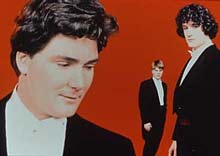The Jacques Thibaud String Trio
March 26, 2000 Program
Mozart: Divertimento in E flat, K. 563-IV. Andante
Beethoven: String Trio Op. 9, No. 3 in c minor
Ernö Dohnányi: Serenade in C major for String Trio, Op. 10
I. Marcia
V. Rondo
| |
 |
 |
|
The Jacques Thibaud String Trio. Burkhard
Maiss, Violin
Philip Douvier, Viola
Uwe Hirth-Schmidt, Cello
Musician
Web Site
|
|
Violinist Jacques Thibaud (1880-1953) studied at the Paris Conservatoire
from the precocious age of 13, graduating with a first prize in 1896.
He began his career as a soloist, touring widely in Europe and the United
States in the early 1900s, but he is most known for his trio playing
with cellist Pablo Casals (1876-1973) and pianist Alfred Corto (1877-1962).
The trio, formed in 1905, immediately became one of the premiere chamber
ensembles and many of their recordings have become grammaphone classics.
Thibaud continued to perform even into his seventies, and died in an
airplane crash on his way to a concert in 1953.
Ernö Dohnányi (1877-1960) is considered to be one
of the main forces in 20th century Hungarian music. Born in Pozsony
(now Bratislava), he was educated at the Budapest Academy along with
his childhood friend, Bela Barók. Dohnányi was renowned
as a pianist, and his first major work, The Piano Quintet in C minor,
had its premiere in Vienna under Johannes Brahms, and shortly thereafter
he was acclaimed to be the greatest Hungarian pianist since Liszt. After
a 10-year hiatus teaching in Berlin, Dohnányi returned to Budapest
with the goal of raising his country's musical tastes. He was extremely
active - he performed more than120 concerts in Budapest alone in the
years 1919-21 - and served 25 years as the chief conductor of the Philharmonic
Society. He resigned his post as head of the Budapest Academy in 1941,
refusing to follow anti-Jewish legislation, and spent the war years
in Vienna. He eventually emigrated to the United States and settled
in Tallahassee in 1949, where he became pianist and composer-in-residence
at Florida State University. He died in New York in 1960. His own compositions
drew upon both classical and Romantic sources, and are characterized
by a vivacious lyricism and a touch of humor. His works for chamber
ensembles, including the Serenade in C played by the Jacques Thibaud
String Trio on this week's program, are particularly well-regarded.
|
